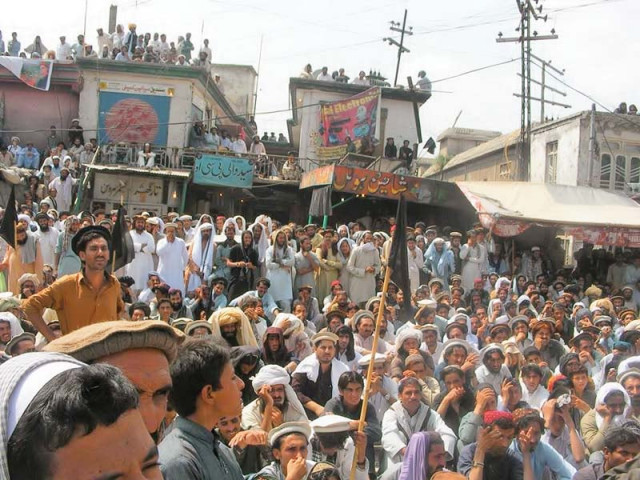Border issue: SWA residents raise a voice against closure of Angoor Adda
Protesters gathered at Wana Bazaar; markets closed down prior to demonstration

Protesters hold banners inscribed with slogans against the closure. PHOTO: EXPRESS
The rally started from a vehicle stand at Azam Warsak and made its way to the Wana Bazaar of South Waziristan Agency.
The protesters held banners inscribed with slogans against the closure of border and also carried black flags.
Wana Bazaar and other markets were closed down prior to the protest. Thousands of people participated in the rally.
“The Angoor Adda border facility should immediately be opened so that contact across the border is resumed,” said Pakistan Tehreek-e-Insaf activist Ajab Gul while addressing the rally. “Local tribes want peaceful coexistence between Pakistan and Afghanistan.”
“Due to the closure of border the poor tribes are suffering,” ANP leader Ayaz Wazir said. “The government should take notice of the grievances of the locals who are already suffering a great deal due to terrorism.”
Angoor Adda has remained closed since Pakistan handed over Angoor Adda border crossing facility to the Afghan authorities on May 21, 2016.
Earlier, the Pakistan Army announced Angoor Adda border crossing facility was handed over to the Afghan authorities to strengthen brotherly relations between Pakistan and Afghanistan and with a strategic intent to improve border management.
The Angoor Adda border gate is located about 55 kilometres south of Wana Bazaar.
“Since then, public and trade vehicles have not crossed the border, creating hardships for local tribes living on both sides.” a local told The Express Tribune. “There were bodies on the other side, we tried to bring them from across the border into Pakistan, but were not allowed.”
Both sides of the border are populated by the Ahmadzai-Wazir tribe. Members of the tribe crossed the border without any travel documents for years until restrictions were imposed and Pakistan built a proper border crossing facility.
The tribes living on both sides are not only related by blood, but also have trade-based daily interaction. It has been common for locals to cross the border in the morning and return to their respective countries in the evening.
There are even instances where children cross the border daily to go to school located on the Pakistani side. The local jirga have conveyed their grievances to the government time and again but nothing has been done to resolve the situation as the border remains closed to this day.
Published in The Express Tribune, July 15th, 2016.













COMMENTS
Comments are moderated and generally will be posted if they are on-topic and not abusive.
For more information, please see our Comments FAQ